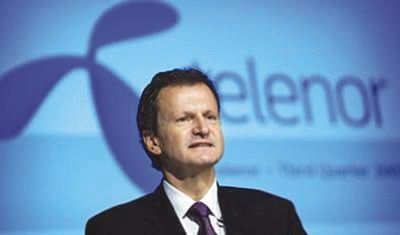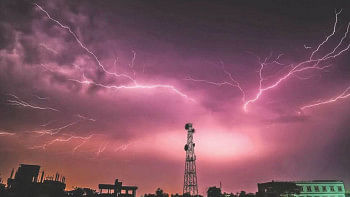Spectrum fee must reflect govt's tech vision

Jon Fredrik Baksaas, president and chief executive officer of Telenor Group, has underlined a balance between spectrum fees and the government's ambition to provide telecommunication services to people.
“We are ready to move on to the next generation technology. There is still a need to find a balance between the spectrum fee and incentives for people,” Baksaas said.
He spoke to The Daily Star at the recent GSMA World Mobile Congress 2012 in Barcelona, Spain. He shared his views in brief on third generation (3G) mobile technology that facilitates high-speed data transfer through mobile phones.
“Generally speaking, any government needs to try to strike a balance between spectrum fee and the telecommunication ambition to get good penetration and coverage," said the boss of Telenor Group, the key shareholder in Grameenphone.
“Grameenphone covers 99 percent of the population in Bangladesh. It is running the industry tremendously and makes a significant contribution to the income file of the government.”
On the people's ability to afford 3G service in Bangladesh, Baksaas said everything is in evolution. Years ago, it was said that the mobile phone is unaffordable for a great number of people. But people do not say that anymore, he added.
A large number of people in Bangladesh can afford a mobile; there are still more to come, he said.
“Within those who are connected, there are still people who want to go to the next layer of mobile technology -- which is 3G.”
He said, “There are already a huge number of people who use the EDGE protocol. It is a very good data communicator. We also use it when we are in Bangladesh. It works well. But when we talk about the speed factor, we should come to 3G.”
EDGE (enhanced data GSM environment) is a mobile technology that provides internet services. Most internet users in Bangladesh use the EDGE technology.
Recently, the Supreme Court of India cancelled 22 mobile licences of Uninor, a joint venture between Telenor and Indian company Unitech, putting its business in uncertainty.
When asked to comment on the issue, Baksaas said, “There is great uncertainty on what will happen in India. Our need is to get clarity on access spectrum. If there is no access spectrum then there will be no progress.”

 For all latest news, follow The Daily Star's Google News channel.
For all latest news, follow The Daily Star's Google News channel. 



Comments